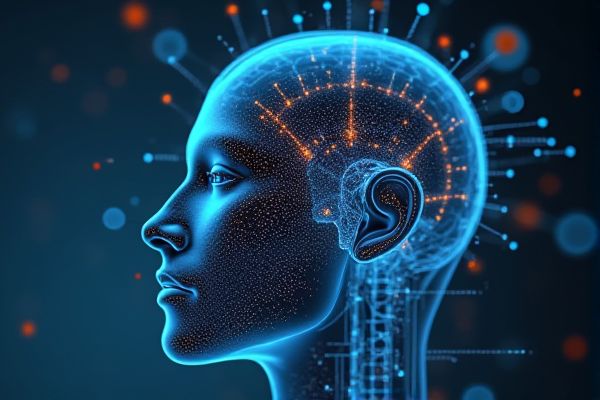
AI plays a transformative role in gerontology by enhancing elderly care through personalized health monitoring and predictive analytics. Machine learning algorithms analyze health data to predict potential issues, allowing for timely interventions to improve patient outcomes. Robotics assist with daily activities and facilitate social interaction, reducing feelings of loneliness and isolation. Telehealth solutions powered by AI provide remote consultations, ensuring that seniors have access to medical expertise without the need for travel.
AI usage in gerontology
Predictive analytics for aging-related diseases
AI has significant potential in gerontology, particularly through predictive analytics for aging-related diseases such as Alzheimer's. By analyzing large datasets, AI can identify patterns that help predict the onset of these conditions, allowing for earlier interventions. This proactive approach may improve the quality of life for elderly individuals and reduce healthcare costs for institutions, such as nursing homes. As research continues to evolve, the integration of AI in gerontological practices may offer substantial advantages in managing aging populations.
AI-driven fall detection systems
AI-driven fall detection systems have the potential to enhance safety for elderly individuals by providing real-time monitoring and alerts. These systems can analyze movement patterns, enabling timely interventions that can prevent serious injuries. Institutions like nursing homes can implement such technologies to improve care quality and operational efficiency. The chances of increasing independence for seniors are significantly higher when assisted by smart technology in their daily routines.
Virtual assistants for elderly care
AI applications in gerontology include the development of virtual assistants that can aid in elderly care. These assistants can provide reminders for medication, facilitate communication with healthcare providers, and offer companionship to reduce feelings of loneliness. Institutions such as nursing homes and senior living facilities may benefit from implementing these technologies to enhance resident quality of life. The potential for better health outcomes and improved well-being represents a significant advantage in this field.
Personalized health monitoring
AI has the potential to enhance personalized health monitoring for the elderly by providing real-time data analysis on individual health metrics. For example, wearables like smartwatches can track vital signs and predict health issues before they escalate. Institutions such as universities and healthcare organizations are exploring AI algorithms that tailor health recommendations based on unique patient profiles. This technology could significantly improve health outcomes and allow for timely interventions in geriatric care.
Cognitive decline assessment tools
AI applications in gerontology can enhance cognitive decline assessment tools, potentially leading to earlier detection of conditions such as dementia. For instance, integrating AI algorithms with neuropsychological tests allows for more precise data interpretation. This integration could provide health professionals with better insights into patient cognitive health. The use of such technology may improve patient outcomes by enabling tailored interventions.
Social companion robots
AI can enhance gerontology by providing social companion robots that assist the elderly in daily tasks and reduce feelings of loneliness. These robots can engage users in conversation, remind them of medications, and even facilitate communication with family members. The integration of AI in this context offers the possibility of improving mental health and overall well-being among seniors. Institutions like nursing homes may benefit significantly from implementing such technologies to create a more supportive environment for their residents.
Medication management systems
AI can enhance gerontology by optimizing medication management systems. These systems can predict potential drug interactions and suggest personalized medication plans, which may improve adherence among the elderly. For example, institutions like assisted living facilities that integrate AI tools can foster better health outcomes. This approach represents a promising opportunity to address the complexities of managing multiple prescriptions in older adults.
AI-powered mobility aids
AI usage in gerontology can enhance the quality of life for older adults by providing personalized care solutions. AI-powered mobility aids, such as smart walkers, offer real-time feedback and navigation support, improving independence. The integration of these technologies may reduce the risk of falls and injuries, presenting a significant advantage for elderly users. Companies like ReWalk Robotics are exploring innovations in this space, showcasing the potential benefits of AI advancements.
Smart home automation for seniors
AI technology can enhance gerontology by providing personalized care solutions for seniors. For instance, smart home automation systems can monitor health metrics and adjust living conditions to improve comfort and safety. These innovations increase the likelihood of seniors maintaining independence while reducing the need for constant caregiver presence. Institutions focused on senior health, such as the National Institute on Aging, are exploring these advancements for broader application in aging populations.
Data-driven aging research insights
AI can enhance gerontology by analyzing large datasets to uncover patterns in aging. Data-driven insights can improve health outcomes for older adults by personalizing care plans. For example, using machine learning models, researchers can predict the onset of age-related diseases like Alzheimer's. This advanced analysis presents a chance to allocate resources more effectively in healthcare institutions focused on elderly care.
 techknowy.com
techknowy.com